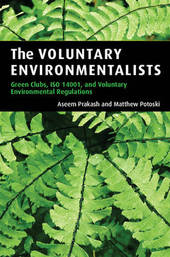
|
The Voluntary Environmentalists: Green Clubs, ISO 14001, and Voluntary Environmental Regulations
Paperback / softback
Main Details
| Title |
The Voluntary Environmentalists: Green Clubs, ISO 14001, and Voluntary Environmental Regulations
|
| Authors and Contributors |
By (author) Aseem Prakash
|
|
By (author) Matthew Potoski
|
| Physical Properties |
| Format:Paperback / softback | | Pages:198 | | Dimensions(mm): Height 228,Width 151 |
|
| Category/Genre | Environmental economics
Business and management
Conservation of the environment |
|---|
| ISBN/Barcode |
9780521677721
|
| Classifications | Dewey:658.4083 |
|---|
| Audience | | Professional & Vocational | |
|---|
| Illustrations |
12 Tables, unspecified
|
|
Publishing Details |
| Publisher |
Cambridge University Press
|
| Imprint |
Cambridge University Press
|
| Publication Date |
29 June 2006 |
| Publication Country |
United Kingdom
|
Description
Can businesses voluntarily adopt progressive environmental policies? Most environmental regulations are based on the assumption that the pursuit of profit leads firms to pollute the environment, and therefore governments must impose mandatory regulations. However, new instruments such as voluntary programs are increasingly important. Drawing on the economic theory of club goods, this book offers a theoretical account of voluntary environmental programs by identifying the institutional features that influence conditions under which programs can be effective. By linking program efficacy to club design, it focuses attention on collective action challenges faced by green clubs. Several analytic techniques are used to investigate the adoption and efficacy of ISO 14001, the most widely recognized voluntary environmental program in the world. These analyses show that, while the value of ISO 14001's brand reputation varies across policy and economic contexts, on average ISO 14001 members pollute less and comply better with governmental regulations.
Author Biography
Aseem Prakash is Associate Professor of Political Science at University of Washington-Seattle. He serves as an adjunct faculty at the Evans School of Public Affairs. From 1997 to 2002, he was Assistant Professor of Strategic Management and Public Policy at the School of Business, The George Washington University. Professor Prakash received a Joint Ph.D. from the Department of Political Science and the School of Public and Environmental Affairs (SPEA), Indiana University, Bloomington and holds an MBA from the Indian Institute of Management, Ahmedabad. Aseem Prakash is interested in issues of governance: how do governance institutions emerge, how they function, and how they impact outcomes. Much of his research focuses on non-governmental institutions in the environmental policy area, and how business-government-NGO dynamics influence their adoption, functioning, and efficacy. Professor Prakash is the author of Greening the Firm (2000, Cambridge University Press) and the co-author of The Voluntary Environmentalists (2006, Cambridge University Press) and has published over two dozen articles in leading journals in the political and managerial sciences. Matthew Potoski is an Associate Professor in the Department of Political Science, Iowa State University.
Reviews'When do firms choose to follow voluntary environmental standards? Why do they apparently seek less freedom to pollute? Using the theory of green clubs and evidence from ISO 14001, Prakash and Potoski help resolve these policy mysteries. The Voluntary Environmentalists should interest readers concerned with finding innovative ways to improve environmental performance.' James T. Hamilton, Duke University 'This excellent and well-researched study provides a valuable resource for scholars and practitioners in determining how to adjust our regulatory and other strategies to the demands of a new and more challenging era of environmental problem-solving.' Daniel J. Fiorino, American University 'Prakash and Potoski have given us the most theoretically and empirically compelling study of voluntary environmental regulation in political science, economics and public policy combined.' Dan Carpenter, Harvard University
|